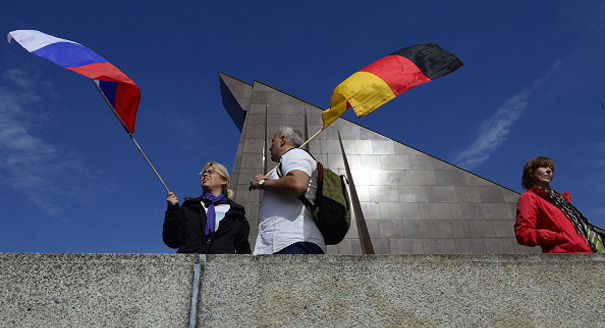How Germany perceives Russia matters. Germany’s perception affects Europe. It affects the transatlantic relationship. It affects Germany’s reputation with its Eastern neighbors. And it affects stability and security.
The complex German-Russian relationship, forged over centuries by war, rivalry, alliances, invasion, and a certain respect, has shaped the two countries’ views of each other, particularly since the end of World War II.
But surveys published in April 2016 by two German foundations—Körber and Bertelsmann—show how Germany’s and Russia’s fundamental perceptions of each other have changed for the worse because of Russia’s invasion of eastern Ukraine in 2014. Though neither survey tackles the long-term consequences of those shifts, Russia’s relationships with Germany, Europe, and the United States have become unpredictable and aggressive.
In the early 1950s, West Germany’s first postwar chancellor, Konrad Adenauer, began reaching out to the Kremlin. The conservative leader sought some kind of rapprochement, predictability, even possibly gradual reconciliation with the Soviet Union as the Cold War intensified and the ideological divide between East and West deepened.
This policy of rapprochement took shape over the following decades, with Germany’s Social Democrats pursuing an approach known as Ostpolitik. This Eastern policy, exemplified by West Germany signing a major gas pipeline deal with Moscow in 1981 much to the chagrin of the United States, was aimed at reaching out to Russia in the belief that slowly, over time, economic, social, and political ties would bring the country closer to Europe.
That didn’t happen. Russia’s annexation of Crimea in March 2014 and its subsequent invasion of eastern Ukraine, its hybrid war, its determination not to lose its strategic influence over Ukraine, and its intimidation of the EU’s and NATO’s Eastern members have changed Germans’ views of Russia.
For the Körber Foundation, at issue now is what policy Germany can and should pursue with regard to Russia. The foundation’s survey, called “Russia in Europe: Rapprochement or Isolation?,” showed that 50 percent of Germans believe that Russia does not belong to Europe (with 51 percent of Russians thinking the same). In the Bertelsmann Foundation’s survey, called a “Frayed Partnership: German Public Opinion on Russia,” 64 percent of Germans believe that Russian President Vladimir Putin is not a credible partner for Germany.
It is not only the Ukraine crisis that has shaped these views. It is also Putin’s disregard for the rule of law, media freedom, and judicial independence. Interestingly, despite the Kremlin’s tight control over the state media and the near absence of any opposition, Körber showed that 86 percent of Russians (compared with 95 percent of Germans) believe a just society is impossible without an independent judiciary and independent courts.
The flip side is that 77 percent of Russians (36 percent of Germans) believe the task of the media is to support the government’s work and comply with its decisions, while 58 percent of Russians (compared with 11 percent of Germans) say that strikes and demonstrations jeopardize public order and should be banned.
These changing perceptions have security implications, particularly for NATO. The alliance’s Eastern members, especially Poland and the Baltic states, feel threatened by Russia and want NATO to do more to defend them. Bertelsmann showed that Germans don’t seem in a rush to oblige. Over half of Germans would not support sending their soldiers to defend Poland or the Baltic states if these allies were attacked by Russia. Indeed, only about 31 percent of Germans believe that if these countries were attacked, Berlin should fulfill Article 5 of the NATO treaty, which declares that an attack on one member is an attack on all.
Despite the German government’s reluctance to support NATO deploying troops on a permanent basis in these countries, 40 percent of Germans support the idea, but 49 percent oppose it. The consensus among the political elites and the public is that such a move would antagonize Russia.
There is a trove of other opinions in these two surveys. But given the deteriorating relationship between Germany and Russia, Körber tried to tease out whether it would be at all possible for Germany to have a rapprochement with Russia. The foundation’s own view is that Russia belongs to Europe, despite the findings of its survey.
The surveys’ answers also reveal that the gap between Germany and Russia over values is widening, the meaning of democracy is understood very differently in the two countries, and, above all, almost half of Germans believe Russia represents a threat. The implicit conclusion is that Russia is moving away from Europe.
As long as these trends and perceptions prevail, German economic and political elites who are lobbying hard for a return to business as usual won’t find much support from the public, and especially not from Chancellor Angela Merkel.
Yet that hasn’t stopped them from trying to restore the old days. On April 11, a top delegation from the German Committee on Eastern European Economic Relations, an industry association that loathes the EU’s sanctions on Russia, met Putin in the Kremlin. The members of the committee yearn for a rapprochement—as if the era of Ostpolitik could be revived, as if that era brought Russia politically and socially closer to Europe.






